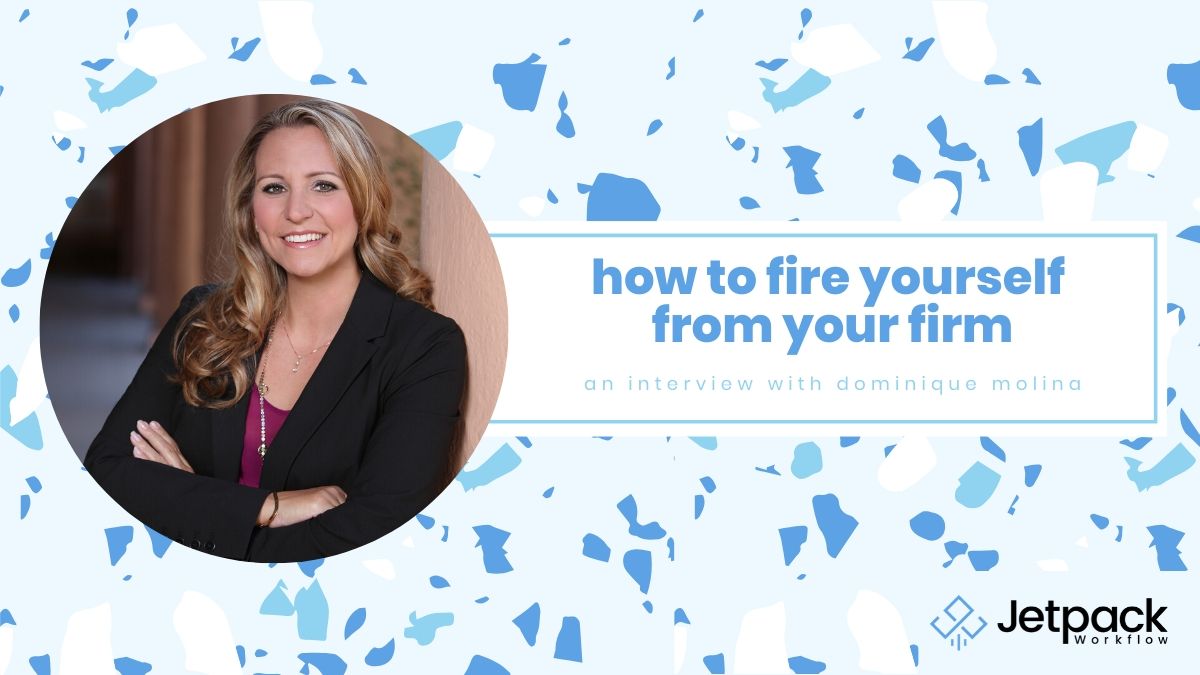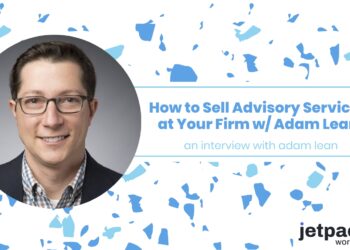How To Fire Yourself From Your Firm

Learning how to grow your firm is the aim of our podcast, but there’s a certain point in your growth where you have to be able to step back and see where you’re going. For many firm owners, this can feel like an impossible task. We’re going to talk about a way to make it happen.
In this week’s Growing Your Firm podcast, we’re talking with Dominique Molina from Certified Tax Planners. She’s also the President of the American Institute of Certified Tax Coaches, a discussion leader for the AICPA, and a tax course instructor for CPE Link. Our discussion today is how you can “fire” yourself from your firm by implementing systems that will let your business run itself.
Before the tax storm hits too hard, you might want to think about her suggestions and how you might use them at your firm. We want to thank Dominique for spending some time with us and hope you enjoy the knowledge.
In this episode of the Growing Your Firm Podcast, David Cristello and Dominique Molina discuss:
- The trap of relying on one person, no matter what your end goal
- Why it’s better to work better, not harder
- The three things you need to work better at your business
Additional Links:
- https://certifiedtaxplanners.com
- Jackie Meyer’s podcast on focusing on a core product (mentioned in the podcast)
Build Systems To Fire Yourself And Get Free
It’s tax season right now. People in the accounting world often get overwhelmed during this time like their head is about to explode. For the unprepared accounting firm owner, it can feel even worse. You start your own business because you think you’ll be a better boss or it will be easier doing it on your own and then find out it’s much harder.
If you’re the one doing the work there’s no one to steer the ship. That’s a dangerous situation. These firm owners end up working for their business rather than on their business. This keeps their firms from reaching their full potential. It can even cause them to fail.
They have to learn how to fire themselves so they can step back and take back their business. The way to do this is to build systems for your business and trust them to work. Easier said than done! Let’s look at some of the challenges.
Depending On A Person
Here is a common trap I’ve seen. An accounting firm starts to take off because one or two people in the business are rockstars at their job. It could be the owner to start, but it often ends up being a hire. They knock it out of the park and the clients love their work.
An owner might want to push this rockstar employee higher. They may even want to turn the firm over to them when they retire. But what happens if that person gets sick or decides to leave for a new opportunity? Your magical unicorn employee is gone and you’re left with a shell of a business.
Investors learn how to smell this situation. If they can see that the value of the business isn’t in the business but in the work of an employee and their knowledge, they won’t buy or they’ll demand a discount.
If you plan on leaving the business as a legacy to your family you still have the same situation. You probably know stories of later generations getting a business then running it into the ground because the retired owner had all the knowledge or change things so that the competent employees leave.
There’s another danger that comes with relying on people. By and large, people do want to do right by their work but there are bad apples out there. People can steal client lists or do other sinister things. Combine this with the unreliability of life that can draw even the best worker away and you have a recipe for risk.
Better, Not More
Here’s another challenge for firm owners. How do you scale your business? The common idea is that you have to work harder. Put in more hours. Push your employees to do more. I like to take a different approach. I say that firm owners need to learn how to work better, not harder.
Better, in this case, means building systems that can handle all of the variables of a process and create something efficient and manageable. This doesn’t just have to be for your accounting products either. It can include things like onboarding, client communications, marketing, and so much more. It’s far less stressful to focus on better systems than more work.
The cool thing about this is that when you focus on making your systems better you end up with a better end result. You can raise your level of quality while reducing the amount of effort. There is a beauty in this that can make it quite exciting to go to work each day and see the systems functioning as they should to grow your business and increase your profits.
Where To Start
We live in an amazing time full of accounting and business technology. Building a technology toolchain is the first optimization that I recommend to accounting firms, especially smaller boutique firms. Technology allows us to do two things:
- Automate routine tasks
- Check to ensure that a job is done accurately and correctly.
If you can reduce inefficiency through automation and put in checks and balances to ensure that the endpoint of any product is accurate and correct, that’s a major win.
The second thing that I recommend is to figure out which products you should be offering. What I often see is firms offering whatever the public demands. Someone can come in and ask if you do international tax. The firm owner thinks they can learn it, says yes, and then gets overwhelmed trying to deliver on the promise.
It’s much easier and more lucrative to pick a hallmark product, price it a way that will lead your business to where you want it to go, and go deep into your expertise and knowledge of that core product so you can do the best job you can. Plus, it makes it much easier to do your marketing.
How do you choose? I look for two things. First, pick something you’re passionate about, something you love to study and do. Something you feel good about doing at the end of the day. For me, that’s tax strategy. I really feel like I deliver my ultimate value to my clients when I do this task.
The other thing is that you have to get paid really well for it. You have to take that skill you love and construct it in such a way that allows you to price it at higher than the typical market rate, and then you have to learn how to communicate the value your passion service provides to your clients so they’ll be willing to pay the higher price. If I just say that I charge $35,000 for a service, they’ll choke and I’ll never hear from them again. If I can communicate what I provide and how it will help them first, it makes the pain of the price much easier to bear.
And if you’re not doing the work you’re passionate about right now, it’s okay to change! It’s never too late to change. Life is too short. You can find something you enjoy doing and have your experience not go to waste.
The last thing is finding people who will support you and your vision. It’s tough to run any business on your own and you need more than just employees or contractors. Mentors, advisors, your peer group, and consultants are also part of your core team because they can understand where you are, help you see your blinds, and give you the advice you need to grow.
If you can get these three areas of your business aligned and systematized, you’ll be able to step out from under your work and look at where you’re going with clearer eyes, more profit, and far less stress. You don’t have to do it all at once. Try starting by mapping out your existing services, then map out your ideal process and see what you can do to bring them into alignment one step at a time. Investigate technology to fix inefficiencies. Learn from your best employees so you can abstract their knowledge into a process. Little by little, you’ll have less to worry about during the day. Eventually, you’ll realize that you can step away and think about your business without it falling apart because you’re not in it. That’s where the fun can really begin.
RELATED ARTICLES:





